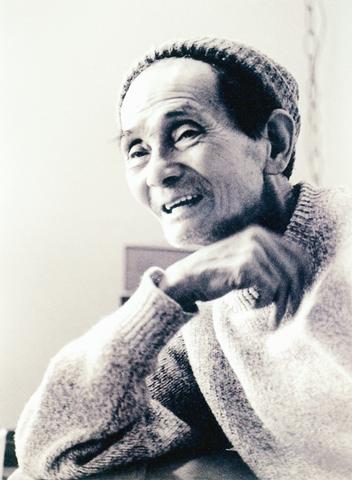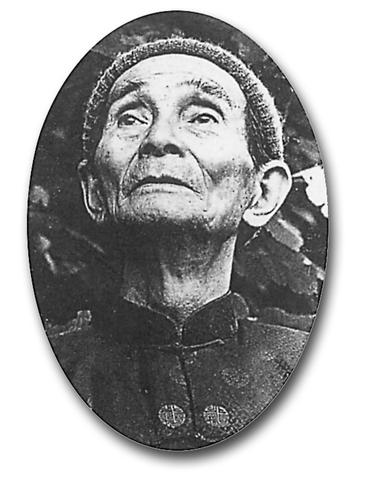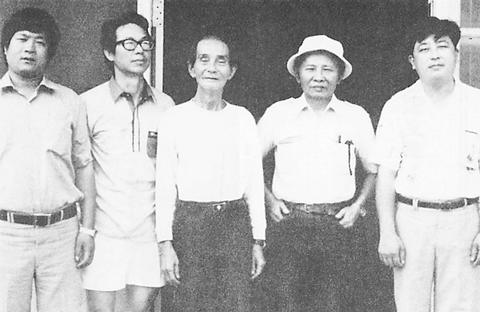Taiwanese author Yang Kui (
Years later he would wryly remark that he "is the best-rewarded writer in the history of Taiwan, averaging a five-day jail term per word."

PHOTO COURTESY OF THE NATIONAL CULTURAL HERITAGE PRESERVATION RE
According to the prominent Hakka writer Chung Chau-cheng (

Chung said Yang not only expressed his opposition to repressive Japanese colonial rule, but was also motivated by a strong sense of class-consciousness, which greatly enlightened writers of subsequent generations.
Born into a tinsmith's family in Tainan, Yang witnessed the 1915 Tapani Massacre by the Japanese (

PHOTO: COURTESY OF AVANT GRADE PUBLISHING CO
As a teenager, Yang was interested in Japanese, Russian and Western realist literature, such as Victor Hugo's Les Miserables, and became engrossed in their themes of humanism.
He fled to Japan in 1924 to escape an arranged marriage and there continued his studies. While in Japan, Yang was deeply impressed by the mainstream development of socialism.
"Yang was a true believer in Marxism, but not dogmatic. He used his literary works to deal with class and racial issues of his time, vividly expressing his stern opposition to colonialism and imperialism," said Chen Fang-ming (
In Japan, Yang worked his way through college as a newspaper boy and a part-time cement worker -- experiences that would later provide the backdrops to his novels. He was arrested for the first time on a charge of participating in a demonstration, but spent only three days in jail.
In 1927, at the request of farmers' organizations, Yang returned to Taiwan to join forces with them in promoting farmers' movements. Beginning from this time, Yang and his wife Yeh Tao (
Yang was honored in 1934 as the first Taiwanese writer to receive the Literary Criticism Award with his book The Newspaper Boy (
The Newspaper Boy, written in 1932 in Japanese, tells the story of Taiwanese newspaper boys' miserable lives and exploitation at the hands of a Japanese newspaper owner, who is eventually brought down when the workers go on strike for better pay and working conditions. The novel not only was an open rebuke of capitalism, but also centered on class struggle and conflict.
"The confrontation [presented in Yang's work] was not an oversimplified story of disadvantaged Taiwanese and advantaged Japanese. The story was complicated by human nature," said Yang's granddaughter, Yang Tsui (
Yang devoted his youth to farmers' movements in the 1930s and took charge in the movements' organization, earning praise as a pioneer of so-called "committed literature" (參與的文學) in Taiwan, a genre which usually depicts the poverty and misery of the poor and disenfranchised. Yang's strong opposition to capitalism even led him to name his first son Yang Tzu-beng (楊資崩), the son's given name translating as "the collapse of capitalism."
"Yang was not all talk and no action. He used his novels to correct the erroneous history forced on people by their rulers, and, moreover, he exerted his leadership on farmers' organizations," said Lin Juei-min (林瑞明), professor of Taiwanese literature at National Cheng Kung University.
Yang's legacy is simultaneously one of a social activist and of a man of letters.
"Yang's importance in the social movement outweighed that of his literary achievement," said writer Tseng Ching-wen (
Other critics, however, see a literary giant in Yang's writings.
Chen of Chengchi University cites, for example, Yang's masterpiece In Bud (
Yang continued to be as outspoken and radical under KMT rule as he was under Japanese colonial rule, Chen said. He introduced works by China's leftist writer Lu Xun (魯迅) to Taiwan, was highly critical of the KMT's policy to promote Mandarin and even encouraged young people in Taiwan to organize self-defense corps to fight the KMT, all of which could have earned him a death sentence.
To silence him, the KMT tried locking him up. But even that did not work. During his 12-year imprisonment on Green Island (綠島), which began in 1949, Yang wrote letters home, literary works on the jail wall and critiques dubbed "roses that cannot be squelched" (壓不扁的玫瑰).
Yang finished his days at his own Tonghai Garden (
"Yang was a very quiet person. He could read at his desk without uttering a word all day," said Lin, who spent a year with Yang.
Yang's granddaughter described the writer as a typical Taiwanese grandfather, who was at times childlike. "He was a very innocent, romantic and optimistic person, who insisted on distancing himself from power," she said, summing up the man's three driving motivations in life as knowledge, labor and social movements.

In the March 9 edition of the Taipei Times a piece by Ninon Godefroy ran with the headine “The quiet, gentle rhythm of Taiwan.” It started with the line “Taiwan is a small, humble place. There is no Eiffel Tower, no pyramids — no singular attraction that draws the world’s attention.” I laughed out loud at that. This was out of no disrespect for the author or the piece, which made some interesting analogies and good points about how both Din Tai Fung’s and Taiwan Semiconductor Manufacturing Co’s (TSMC, 台積電) meticulous attention to detail and quality are not quite up to

April 21 to April 27 Hsieh Er’s (謝娥) political fortunes were rising fast after she got out of jail and joined the Chinese Nationalist Party (KMT) in December 1945. Not only did she hold key positions in various committees, she was elected the only woman on the Taipei City Council and headed to Nanjing in 1946 as the sole Taiwanese female representative to the National Constituent Assembly. With the support of first lady Soong May-ling (宋美齡), she started the Taipei Women’s Association and Taiwan Provincial Women’s Association, where she

Chinese Nationalist Party (KMT) Chairman Eric Chu (朱立倫) hatched a bold plan to charge forward and seize the initiative when he held a protest in front of the Taipei City Prosecutors’ Office. Though risky, because illegal, its success would help tackle at least six problems facing both himself and the KMT. What he did not see coming was Taipei Mayor Chiang Wan-an (將萬安) tripping him up out of the gate. In spite of Chu being the most consequential and successful KMT chairman since the early 2010s — arguably saving the party from financial ruin and restoring its electoral viability —

It is one of the more remarkable facts of Taiwan history that it was never occupied or claimed by any of the numerous kingdoms of southern China — Han or otherwise — that lay just across the water from it. None of their brilliant ministers ever discovered that Taiwan was a “core interest” of the state whose annexation was “inevitable.” As Paul Kua notes in an excellent monograph laying out how the Portuguese gave Taiwan the name “Formosa,” the first Europeans to express an interest in occupying Taiwan were the Spanish. Tonio Andrade in his seminal work, How Taiwan Became Chinese,